Co-op Group members gathered in person and online for its AGM on 18 May, as the society celebrates 180 years since the Rochdale Pioneers first opened their doors.
“I feel very strongly that our member-owners are and should be at the heart of everything that we do at the Co-op,” said Debbie White, leading the event for the first time since taking up the role in February. “The founding values and principles the Rochdale Pioneers set down in 1844 have never been as relevant as they are in today’s world. We live in times where individual voices don’t necessarily feel listened to or heard.
“And we live in times where people and communities within the UK feel isolated, sometimes left behind and marginalised.”
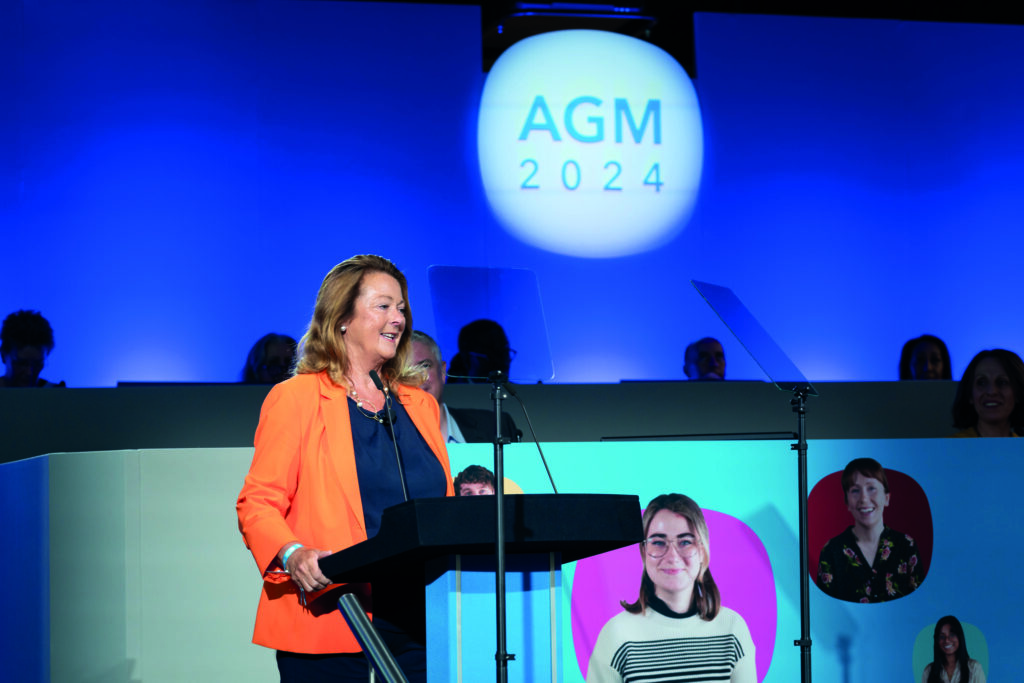
White highlighted how the co-operative business model “is a force for good, that can build trust, can listen and act, can help unite people and bring about positive and lasting change for the betterment of everybody.”
The Group’s 2024 AGM took a slightly different format from previous events, with the first two hours dedicated to presentations from the leadership team, member Q&As and voting, and the final hour reserved for an interactive member discussion session to “listen and engage with members” to help shape future plans.
The early part of the meeting was disrupted by a peaceful protest from Co-op Group members belonging to the Humane League, whose managing director, Sean Gifford, mounted the stage, demanding that the retailer stop selling meat from low-welfare, fast-growing breeds of chicken.
Related: Chris Packham calls on Group to stop sale of ‘Frankenchickens’
At last year’s AGM over 96% of Co-op Group members voted in favour of a motion which asked it to improve the welfare standards for chickens and requested the board to consider adopting the Better Chicken Commitment in full. The only UK retailers to have adopted the commitment in full are M&S and Waitrose.
“Last year Co-op’s membership demanded better lives for the millions of chickens Co-op sells every year,” said Gifford after the event. “Birds who grow so big and fast that they often struggle to walk, who so often live in pain with inflamed joints, deformed bones and burns on their bodies, should not be kept anywhere, let alone by an ‘ethical retailer’.”
Responding to the animal welfare concerns, member-nominated director Kate Allum said the Group had worked to gather more data and insight since last year’s AGM. While members’ feedback suggested that welfare was very important, it was not the only factor that matters to them. She said research conducted by the Group suggests the switch would cost more, put demand on farmers, and have a higher sustainability impact. She concluded that moving to the slowing-growing breed was not the right answer and the retailer would not be doing it for now.
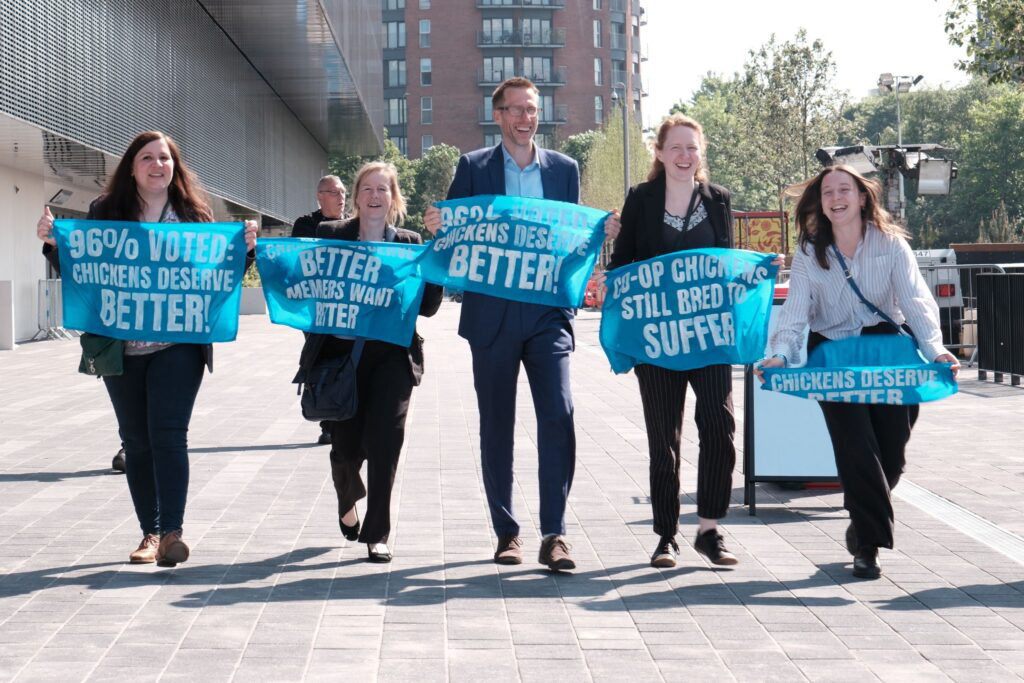
As of February, all Co-op Group fresh chicken is bred to a maximum stocking density of 30kg/m2, from the previous specification of 38kg/m2, following a multi-million pound investment. Through its Space to Thrive initiative, the Group plans to introduce a similar measure for all of the British chicken used in added value poultry products, such as breaded chicken.
But Aaron Parr, a senior campaigner at the Humane League who asked a question as a member, said the initiative suggests that “animals are going to have a decent life and that is not the case.”
Allum said member feedback on Space to Thrive had been positive. She said the Group would continue to monitor existing arrangements and decide how to move forward.
Related: Annual results from the Group and other UK retail co-ops
During the AGM, National Members’ Council president Denise Scott-McDonald told how one of the organisation’s roles is “to do right by others and the world we live in,” and how it was the power of members’ voices which drove the recent campaign on tackling violence against colleagues in stores, working with other co-ops and retailers. “We changed the law to make violence against shop workers a standalone offence,” she said. “That’s a major achievement. We did that together.”
The council has also been active in sustainability, mental health and diversity, she added, “and we have grown our membership base. There are 5 million of us, and our goal is to go even further and add another 3 million by the end of the decade. Nearly 50% of our new members last year and the year before were under 35. We are creating the next generation of co-operators who want to make sustainable choices and who believe that we can do good”.
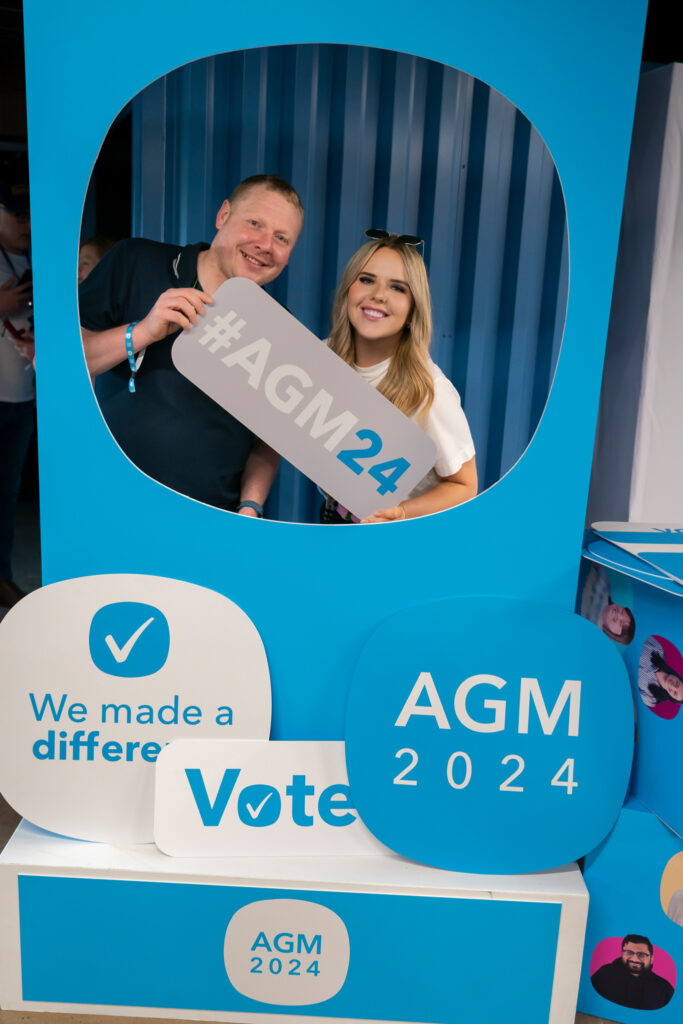
But there is much more to do, she said. “We might have to make difficult decisions, and we might not always agree. But that’s also what makes us special. The power of co-operation is about what we can achieve together and how this benefits us, our fellow owners and the world we live in. If we get this right, I firmly believe we will realise our potential.”
CEO Shirine Khoury-Haq presented the Group’s financial performance, vision, and ambitions. “It was a year where we significantly increased our underlying financial performance, and a year where we continued to deliver for our member-owners, our colleagues and our communities during the cost of living crisis,” she said. “It was also a year where we crystallised our thinking for the future and finalised our vision and our strategy, which will herald a new era of co-operation.
Related: Co-op Group joins business action pledge on early childhood
“This is all a testament to the commitment of our amazing 56,000 colleagues who have worked so hard to deliver our products and our services, but also it’s a result of your continued commitment and loyalty.”
The Group made an annualised investment of £90m in lowering food prices, improved member offers, and raised £24m for communities, she added.
The financial situation was set out by Rachel Izzard, who joined the executive board last June as chief financial officer for finance and procurement.
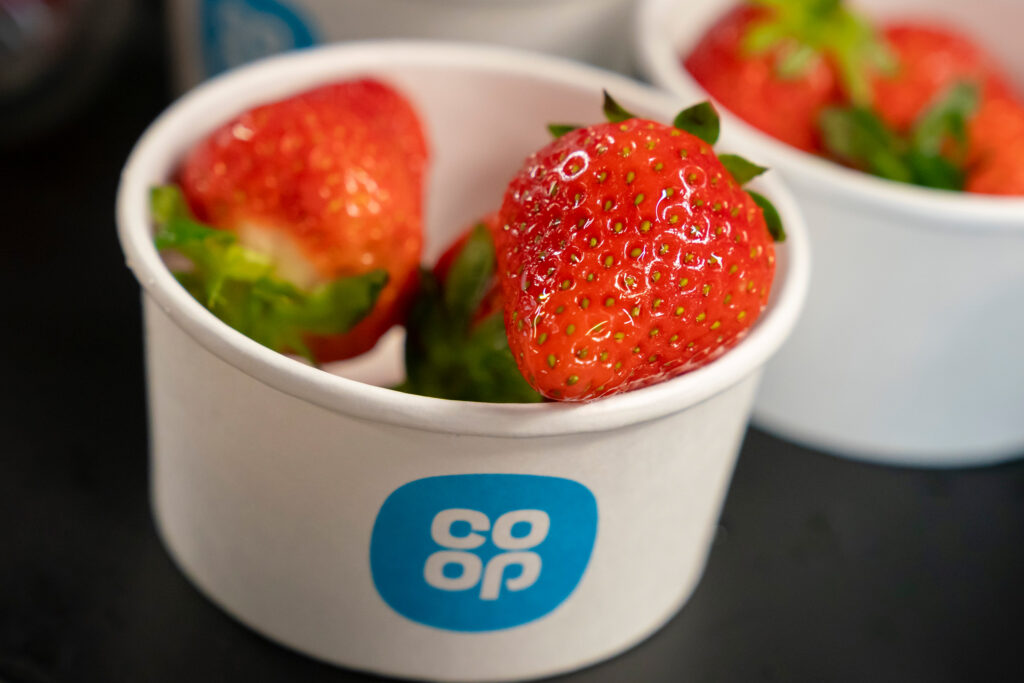
“To summarise our 2023 results, we delivered robust sales growth across all of the Group,
we offset significant headwinds and maintained trading earnings in a resize and reshape of
our footprint, we improved bottom line profitability – and we generated cash to further strengthen our balance sheet,” she said, adding that the Group also reduced its core net debt to £82m – “which is £230m lower than the year before and more than £800m lower than two years ago”.
This leaves the Group “in a great place to move on to profitable sustainable growth,” she said.
Kenyatte Nelson, who joined the business in January 2023 as chief membership and customer officer, shared the society’s work on member-ownership, building on its work with consultations with members, colleagues and communities.
“Member ownership sits at the centre of our strategic intention for the business for the next few years and then, frankly, for the foreseeable future,” he said. “Our work on our co-op difference and our vision sets the perfect platform to evolve our ownership proposition across three key but equally important elements and to make membership both irresistible and indispensable.”
These three elements are economic value, from products and services; social value, “derived from the things that member owners care about”; and ownership value, “which is the value created by owning and having a say in how our co-op is run”.
Member discounts and offers were also on the agenda, with some delegates saying they missed the days when they received a divi. It was also pointed out that the shift from saving points to giving discounts caused upset for some lower-income families, who saved the points to spend on Christmas shopping.
Khoury-Haq said surveys revealed members wanted better prices on everyday essentials to cope with the cost-of-living crisis. She added that the Group may choose a different approach in the future and said it would consider exploring how to let members to choose between having points added or getting member discounts.
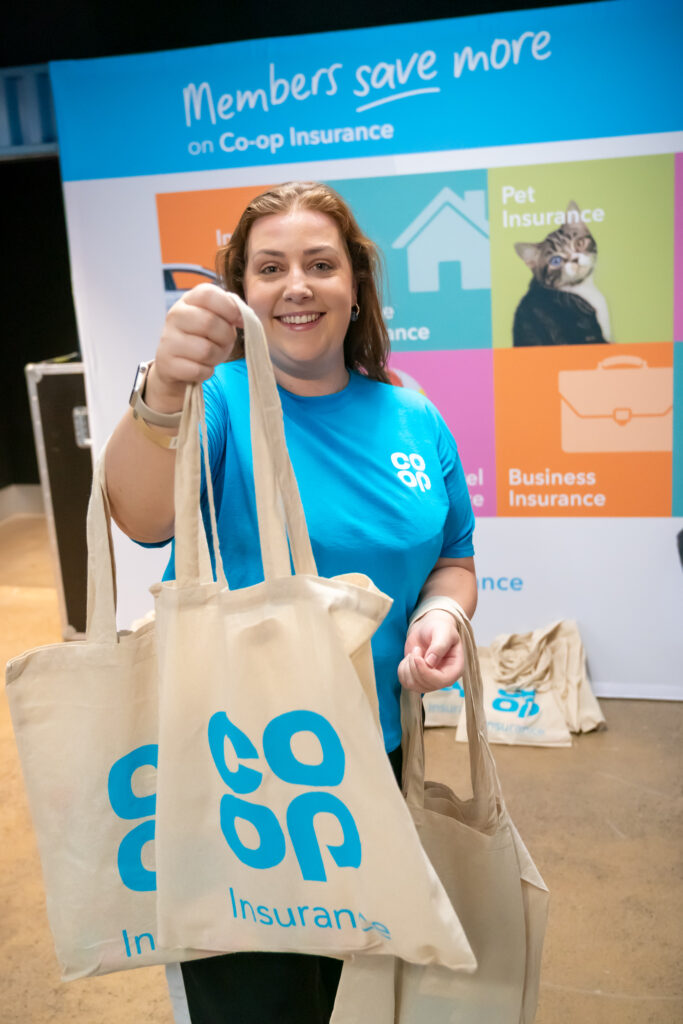
Other members had questions about what the Co-op Group was doing in response to the conflict in Gaza.
Since 2009, the Co-operative Group has operated a Human Rights and Trade Policy, under which it does not source any produce or own-brand products from the Israeli settlements in the Palestinian Occupied Territories or engage with any supplier of produce known to be sourcing from the Israeli settlements. The Group has also provided aid to Gaza through partnerships with Oxfam and One Water and continues to engage with the Disasters Emergency Committee (DEC) to take additional steps.
Members representing independent co-ops also wanted to know whether the Group had made progress on a membership card that could be used across all co-op societies – an idea suggested at the previous AGM.
Khoury-Haq said this had been explored but deemed infeasible due to societies having different membership systems and ways of calculating points. Integrating cards from other societies would be too expensive, she said, adding that this was a dream shattered for her.
All motions presented to delegates were passed. This included chair Debbie White being confirmed as an independent non-executive director with 86% of the votes in favour (Motion 5).
Members also voted to elect Rachel Izzard as an executive director, and Adrian Marsh, Moni Mannings and Luke Jensen as independent non-executive directors.
Motion 9 to re-appoint Ernst & Young LLP as auditors and authorise the Risk and Audit Committee to fix their remuneration was also carried.
Motion 10 approved political expenditure, including donations and/or subscriptions to political parties, not exceeding £750,000 in total for the year commencing 1 January 2025, while other motions carried covered member prices on healthy products, an increased focus on the Safer Colleagues, Safe Communities campaign, and doing more to promote what it means to be a member-owned business which puts people before profit.
The AGM was followed by a discussion moderated by campaigns and public affairs director Paul Gerrard. The session aimed to get members’ views on a range of issues, as well as encourage them to fill in the society’s member survey.
So far, the survey has revealed that three key topics members care about are the environment; sourcing; and diversity, equity and inclusion.
During the discussion, members raised several issues, calling on the society to engage more with local producers, open more stores in disadvantaged areas, turn inactive members into active ones, invest in local music venues and boost member education about co-ops.

